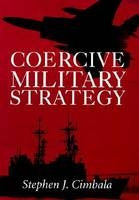
ISBN: 9780890968369
Coercion is persuasion supported by the threat or use of force. Just as warfare is often "diplomacy carried out by other means," coercion--the threat of combat or the threat of an escalat… More...
| BetterWorldBooks.com used in stock. Shipping costs:zzgl. Versandkosten., plus shipping costs Details... |

1999, ISBN: 9780890968369
Texas A&M University Press, Hardcover, 229 Seiten, Publiziert: 1999-01-31T00:00:01Z, Produktgruppe: Book, 0.55 kg, Strategy, Tactics & Military Science, Military History, History, Subject… More...
| amazon.co.uk Shipping costs:Real shipping costs can differ from the ones shown here. (EUR 3.27) Details... |

1998, ISBN: 0890968365
[EAN: 9780890968369], Used, very good, [SC: 43.11], [PU: Texas A & M Univ Pr, College Station, Texas, U.S.A.], MILITARY ART SCIENCE TECHNOLOGY, VG+/VG+. 229 pp. DJ lightly rubbed with sca… More...
| AbeBooks.co.uk Books to Die For, The Woodlands, TX, U.S.A. [125938] [Rating: 5 (of 5)] NOT NEW BOOK. Shipping costs: EUR 43.11 Details... |

1998, ISBN: 9780890968369
Buch, Hardcover, [PU: Texas A & M University Press], Texas A & M University Press, 1998
| lehmanns.de Shipping costs:Versand in 10-15 Tagen. (EUR 0.00) Details... |

1998, ISBN: 0890968365
[EAN: 9780890968369], New book, [SC: 42.25], [PU: Texas AM University Press], Books
| AbeBooks.co.uk Campbell Bookstore, Austin, TX, U.S.A. [83587969] [Rating: 5 (of 5)] NEW BOOK. Shipping costs: EUR 42.25 Details... |


ISBN: 9780890968369
Coercion is persuasion supported by the threat or use of force. Just as warfare is often "diplomacy carried out by other means," coercion--the threat of combat or the threat of an escalat… More...

1999, ISBN: 9780890968369
Texas A&M University Press, Hardcover, 229 Seiten, Publiziert: 1999-01-31T00:00:01Z, Produktgruppe: Book, 0.55 kg, Strategy, Tactics & Military Science, Military History, History, Subject… More...
1998
ISBN: 0890968365
[EAN: 9780890968369], Used, very good, [SC: 43.11], [PU: Texas A & M Univ Pr, College Station, Texas, U.S.A.], MILITARY ART SCIENCE TECHNOLOGY, VG+/VG+. 229 pp. DJ lightly rubbed with sca… More...

1998, ISBN: 9780890968369
Buch, Hardcover, [PU: Texas A & M University Press], Texas A & M University Press, 1998
1998, ISBN: 0890968365
[EAN: 9780890968369], New book, [SC: 42.25], [PU: Texas AM University Press], Books
Bibliographic data of the best matching book
| Author: | |
| Title: | |
| ISBN: |
Details of the book - Coercive Military Strategy
EAN (ISBN-13): 9780890968369
ISBN (ISBN-10): 0890968365
Hardcover
Publishing year: 1998
Publisher: Texas A&M University Press
240 Pages
Weight: 0,553 kg
Language: eng/Englisch
Book in our database since 2007-05-11T10:18:13+01:00 (London)
Detail page last modified on 2023-09-26T21:50:15+01:00 (London)
ISBN/EAN: 0890968365
ISBN - alternate spelling:
0-89096-836-5, 978-0-89096-836-9
Alternate spelling and related search-keywords:
Book author: cimbal
Book title: military strategy
< to archive...

